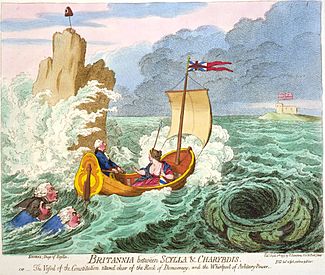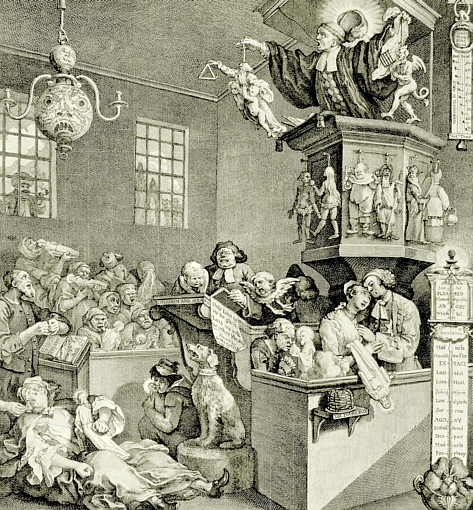Conscience seems to have become a hot topic again in the blogosphere, or at least that part of it which concerns Catholic intellectuals. That happens cyclically, mostly among such Catholics. What's apparent this time around is that conscience
about conscience is sorely needed. The archeology of tradition is being mined selectively at best. That is, as it were, unconscionable.
The current flurry started with the debate over Phoenix Bishop Thomas Olmsted's decision to announce that Sr. Margaret McBride, by approving an abortion in her role as an ethical consultant at St. Joseph's Hospital, had excommunicated herself along with others who had formally cooperated in the procedure. I questioned Olmsted's decision
in
an article at First Things that was cited, without criticism, by
Michael Sean Winters,
Jimmy Akin, and
Terry Mattingly in their own measured treatments of the issue. Of course the matter was extensively debated elsewhere too, and it has become clear that the central issue for the more thoughtful commentators is what role Sr. McBride's conscience played in her decision. Specifically: if in fact she had made her decision in good faith as a well-informed Catholic, what sense would excommunication, or at least an announcement to that effect, make? And why does that question matter?
Such, in effect, are the questions
raised by Dominican bioethicist Kevin P. O'Rourke in the June 21 issue of
America magazine. For the general reasons
given by Jesuit philosopher John Kavanaugh in the same issue, the answers are not obvious. Now Fr. Kavanaugh's penchant for subtly positioning himself above ideology, thus supporting one ideological side more by what he does not say, reminds me of President Obama. That's not a compliment. Not all moral disagreements can be settled by agreement on the relevant facts; in fact, the most fundamental moral disagreements entail disagreements about just which facts
are all and only the relevant facts. But Fr. Kavanaugh is right about the need to know all the relevant facts, which, largely for HIPPA reasons, are almost impossible to learn in the McBride case.
More troubling is the unclarity about principle. I don't mean Catholic teaching about abortion specifically, which is clear enough in the abstract. It's unpopular only because, as the recurring torture debate confirms, unregenerate man is a consequentialist when push comes to shove. But even among non-consequentialists, there's considerable confusion about the concept of conscience itself. Again at
First Things, David Layman raises
concerns about the Thomistic conception of conscience, which in turn are briefly
answered by Brandon Watson at Siris. That's the sort of excursus I want to continue here, because good answers to the Phoenix questions I've posed depend on answering a yet more fundamental question: In what sense could acting in conscience be, itself, culpable?
That's a hard and pervasive question for Catholic moral theology. On the one hand, as both Thomas Aquinas and the CCC (§1790) point out, one is always morally obligated to act according to one's conscience. For
conscience here means one's sincere act of judgment, in light of one's knowledge of the relevant principles and facts, about what it's right to do in the circumstances. To act against that is to alienate oneself from oneself as a moral agent. That is performatively absurd, indeed vicious, by virtue of entailing a deep rupture of integrity. So much is undisputed. On the other hand it is possible, by acting according to one's conscience, to do what is objectively evil
if one's conscience is malformed. Worse, it's even possible to be subjectively blameworthy for such objective evil if one's conscience is
culpably malformed. The example of Nazis and Communists involved, even indirectly, in the mass killing of innocents is enough to show that, but there are many other examples more quotidian.
It follows that somebody who acts in sincere conscience, but erroneously, is thus morally obliged to do something morally wrong. When grave enough, that's tragedy in the purest sense, which didn't end with Hellenic paganism. It may occur less often than some Calvinists and Jansenists have thought, but I do believe it happens more often than most Christians think. Indeed, not many have given the problem much thought at all.
Fortunately, there are important exceptions:
Joseph Ratzinger and
Elizabeth Anscombe, as well as the CCC itself (§1791 ff). Anscombe was not the first, but among recent philosophers was certainly the most prominent, to raise this issue in Catholic moral thought after centuries in which the standard Liguorian conditions ascribing mortal sin to an agent had been used uncritically in pastoral practice. Those were: "grave matter," "full knowledge" thereof, and "full consent" of the will thereto. Very well, but can't a lack of full knowledge itself be culpable? Aren't there lots of cases when people don't "know" what's "grave matter"—i.e., what's objectively and gravely wrong—mainly because they just don't
want to know? Of course there are, even granted that mere humans can't be certain exactly which. So we must admit that the Liguorian schema is inadequate. Those who act wrongly but conscientiously are sometimes culpable for the state of their conscience and hence cannot be exculpated by lack of full knowledge. They're "damned if they do and damned if they don't." Admittedly, that seems unfair. But such a tragedy needn't be permanent; there is such a thing as repentance freely induced by grace, which is not required by "fairness" either. But whatever the population of hell may be, I'm sure a considerable percentage are there because they could have repented of just such a tragedy, yet never did.
Now in a narrowly Catholic context, the question about somebody like McBride is not whether she was acting against her conscience—presumably, she was not—but whether, if she acted wrongly all the same, she did so according to a culpably malformed conscience. My interactions with her conservative, pro-life critics suggest that they believe the answer is yes. If they're right, then excommunication makes sense and calls for her repentance. But my main point had been that we can't know that they're right because we don't know all the relevant facts. Since we don't, and legally can't, know the specifics of the abortion case, we're in no position to assess the plausibility of Sr. McBride's decision about it, and hence we're in no position to make statements about the state of her conscience. To that extent, I sympathize with the complaints of the Kavanaughs.
But even if we did know all the relevant facts using Church teaching on abortion as for our criteria of relevance, and determined that McBride's decision was objectively wrong, a key question about conscience would remain. As my point of departure for that question, I shall begin by quoting Watson on Layman.
Aquinas holds that it is wrong to violate conscience; he mentions in this context Romans 14:23, in which Paul says that everything that is not of faith is of sin. David then asks:
Remember that for Aquinas, conscience is an “act” arising out of the “disposition,” synderesis (ST I, Q 79, A. 13). This disposition is an universal ordering of all humans to the good. According to the glossary...conscience is “the dictate of reason that one should or should not do something.”
If that is true, then how can Aquinas equate an evil “conscience” with the Pauline phrase “everything not of faith?” If a human can know the dictate of reason, “I ought not commit suicide”, through reason–apart from faith–then how can an evil conscience be the absence of faith? The dictate of conscience (according to the Aquinas) does not arise either within faith or apart from faith. It arises from practical reason, determined by synderesis, the disposition (again quoting the glossary of LMP) that all humans “should seek the good proper to their human nature….” But the absence or presence of faith does not bear on this issue. I do not see how Aquinas can properly cite the apostolic text as authority for his claim.
In other words, “conscience” in Paul (and the entire New Testament canon) is a state of moral knowledge known in and through the living (in technical terms, “existential”) reality of a specific community that enacts and expresses a new experience of life and moral reasoning. Aquinas reappropriates this concept and redefines it as a state of moral knowledge known by, and accessible to all humans, apart from that new life.
But a little thought shows that this puzzle is unknotted easily enough. Just as reason, although universal, can be examined specifically in a Christian context, so can universal moral dispositions. That everyone has something in the way of conscience doesn't mean that it is formed in the same way for everyone. And in the Summa Theologiae, which David is considering, Aquinas is not considering conscience "apart from that new life"...
The point is actually generally important for interpreting much of Aquinas's moral theory in the Summa. The long, detailed discussion of virtue in the ST is a discussion of infused virtue. What reason says about acquired virtue comes up quite a bit, of course; but it comes up solely as a starting-point for understanding its infused and charity-formed counterpart. The Summa moves from God ruling over us to God working in us to God being with us; it is, as it says, a work of Christian theology.
The puzzle David Layman identifies, and Brandon Watson tries to clear up, arises from the distinction between conscience as
disposition—which the Aristotelian tradition calls
synderesis—and conscience as the
act of judgment itself. Conscience as disposition, which means the active capacity for moral judgment, appears to be universal, and thus identifiable apart from "faith," in such a way that we can specify what general
sorts of moral judgments people are disposed by such a capacity to make. Hence for Layman, conscience as act does not seem to require assessment in terms of faith—or at any rate, that's how he reads Aquinas. Now Watson argues that Aquinas, given the theological aim and context of the ST, is making no such argument. The Common Doctor is explaining conscience informed by infused faith, not natural conscience. Of course Aquinas thought there is such a thing, but I don't believe that's the only sort of conscience that he, or the Catholic moral tradition generally, is concerned with even for theological purposes.
Ratzinger indicates that, according to said tradition, the way in which conscience as disposition is formed by the life of faith, which includes the infused virtue of
caritas as well, is not a heteronomous imposition on "natural" conscience. The pertinent aspect of his argument may be summed up thus: Just as natural, "speculative" reason affords us a "preamble" to the supernatural, "infused" virtue of faith, so natural, "practical" reason affords us a preamble to the supernatural, "infused" virtue of love—the highest of all the virtues. On the natural level, speculative and practical reason are thus and both
capax gratiae. Accordingly, the relationship between conscience as formed by natural reason and conscience as formed by revelation and grace directly affects today's debates about conscience. How?
Ratzinger suggests that the rather vague and confusing term
synderesis be supplanted by
anamnesis, which here denotes a natural, primordial "memory" of the good, one that can be either elevated by grace or obscured by cultural distortion and personal vice. If such a memory can be obscured but never altogether erased, then it is naturally fit to be elevated by knowledge of the "New Law" of the Gospel, so that its natural content is not opposed to the Gospel but a partially inchoate anticipation thereof. And if that's so, then one cannot excuse certain decisions made in conscience-as-act by saying that one's conscience-as-disposition was never adequately informed by cultural norms or knowledge of revelation. For example,
if it was objectively wrong—which, I stress, we do not know—a decision such as McBride's would be blameworthy as instancing a consequentialism that cannot be excused as somehow "natural." Killing one innocent person to save another is the sort of thing one can know
naturally to be an intrinsic evil, apart from knowing the specifics of divine revelation transmitted by, say, Catholicism. The role of the latter would be not to demonstrate its wrongfulness but to explain it more fully than one could without it.
Contemporary Catholic debates about conscience, I believe, should focus on that issue. The pastoral consequences of taking Ratzinger's, and Anscombe's, position would be fairly obvious. That no such focus seems forthcoming is irresponsible. Intellectual conscience, at least for Catholic theologians, calls for more. Sometimes there's no excuse for not knowing.







































